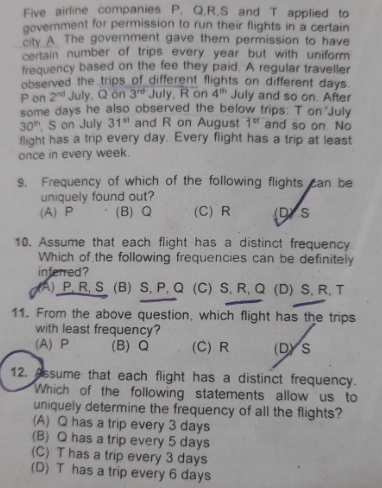Source: It is from a book of logical reasoning questions, the name of which I am not able to verify.
Five airline companies P, Q, R, S and T applied to government permission to run their flights in a certain city. The government gave them permission to have certain number of trips every year but with uniform frequency based on the fee they paid. A regular traveler observed the trips of different flights on different days. P on 2nd July, Q on 3rd July, R on 4th July and so on. After some days he also observed the below trips: T on July 30th, S on July 31st and R on August 1st and so on. No flight has a trip every day. Every flight has a trip at least once in every week.
Question 1: Frequency of which flights among P, Q, R, S can be uniquely found out ?
Question 2: Assume that each flight has a distinct frequency. For what all flights can their frequency be definitely inferred?
My thoughts on the puzzle:
A flight's frequency should lie between 1 flight/week to 3 flights/week.
I focussed on R first as two data points have been provided for it which are 4th July and 1st August.
Considering the initial week from 2nd July to 8th July:
Case 1: R's frequency = 1 flight/week
Dates on which R can fly will be July : 4, 11, 18, 25 and 1st August
This satisfies our conditions given for R
Case 2(a): R's frequency = 2 flights/week
Pair of dates on which R can fly in a week will be:
July: (4,5), (11,12), (18,19), (25,26)
August: (1,2)
This also satisfies the conditions for R i.e. 4th July and August 1
Case 2(b): R's frequency = 2 flights/week
July: (4,6), (11,13), (18,20), (25,27)
August: (1,3)
Case 2(c): R's frequency = 2 flights/week
July: (4,7), (11,14), (18,21), (25,28)
August: (1,4)
Case 2(d): R's frequency = 2 flights/week
July: (4,8), (11,15), (18,22), (25,29)
August: (1,5)
All cases for R = 2 flights/week are valid
Case 3: R = 3 flights/week
which will provide me 6 more subcases in which the dates for in the initial week can be as follows:
July: (4,5,6)
July: (4,5,7)
July: (4,5,8)
July: (4,6,7)
July: (4,6,8)
July (4,7,8)
This would involve a lot of checking, am I doing it correctly or have misunderstood the problem completely?

